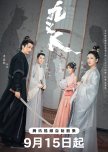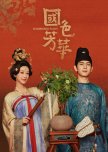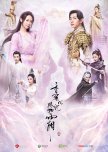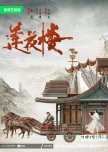
From Ambition to Disillusion
A large-scale drama that blends business intrigue, politics, and female empowerment in early 20th-century China, Wild Ambition Bloom finds its strongest appeal in its ambitious female lead, Chu Shaohua, who repeatedly rebuilds her life after devastating setbacks. The story celebrates women’s resilience and their ability to compete in male-dominated business worlds, offering moments of genuine inspiration and a strong, engaging start.At first, I gave this drama a solid 10/10. The plot and character dynamics kept me fully invested. However, from about episode 22, I’d lower my rating from that point onward. The tone shifted so drastically that it almost felt like watching a completely different drama. The political plotlines became heavy-handed. Chu Shaohua’s rise also often feels too convenient, with major developments in business, identity glossed over, and plot holes. Ambition and greed are central themes, but their moral complexity is only partially explored. While the show depicts the costs of success, isolation and personal loss, these moments often feel more like dramatic spectacle than meaningful reflection.
Ambition and wealth can bring power, but they can also bring enemies and personal emptiness. In my opinion, her simple early village life, built on modest local business, seems in hindsight more fulfilling than the complicated, dangerous world she later inhabits. A storyline where she wasn’t forced to exceed that simpler life might actually have been more inspiring.
Later in the drama, I found nothing uplifting about making the pursuit of wealth the central purpose of life. In fact, it became the opposite — uninspiring. Wild ambition, driven by an endless desire for more, doesn’t necessarily lead to happiness.
A visually strong and thematically bold drama with a compelling heroine and an excellent start, but it loses focus and coherence in the final stretch, shifting from inspiring to disappointing.
Was this review helpful to you?

This review may contain spoilers
Not Much Sword, Secondary Stories Add Romance, & a Tired Cheng Yi in a Fantasy That Drags
It starts as a promising light fantasy drama with themes of transcending fate and choosing one’s own path, but it becomes nonsensical and dragged, making it hard to stay engaged. I actually had to force myself to finish the final episodes.Main Story & Acting
The main romance between Cheng Yi and Li Yitong is disappointingly flat. They share zero romantic spark or emotional connection, not even a believable friendship, more like polite strangers. While the script itself keeps them distant, their chemistry never develops.
Cheng Yi, in particular, feels detached and tired, lacking the emotional intensity and focus he once displayed in Love and Redemption. His performance here feels stoic, repetitive, and emotionally absent, as though he’s acting but not fully present in the role. It’s hard not to wonder if something might be affecting him personally, given his recent performances have also felt less invested.
Supporting Stories
Thankfully, the two secondary romantic storylines provide some relief. These side couples bring energy, humor, and genuine chemistry, even delivering the only kisses in the entire drama. Their playful interactions and lighter tone make them far more engaging than the main leads, and at times, their stories completely overshadow the central "romance".
Action & Production
The sword fights are heavily CGI-enhanced, with lots of wirework, glowing swords, and energy effects. Instead of showcasing real martial arts skill, the combat scenes feel more like digital spectacles, flashy but emotionally empty. The result is a sense of AI-style choreography that looks artificial rather than exciting.
While this style may fit a fantasy setting, it sacrifices the raw authenticity of traditional wuxia fights, which I personally miss.
Themes
The drama aims to explore ideas of fate, destiny, and following one’s heart, but it never achieves the emotional or philosophical depth it strives for.
Final Thoughts
If you have nothing else to watch, it’s passable, otherwise, it doesn’t offer anything particularly new or memorable.
Was this review helpful to you?

A love so inspiring it stirs the soul, leaving you yearning to experience it in life
A meeting of minds, souls, and hearts in a drama enriched with life lessons.I’ve known passion, lust, and affection in my life, but I’ve yet to meet a true soulmate—someone deeply compatible on every level. Watching this drama stirred a quiet melancholy in me, reminding me of the kind of love I’ve always longed for. But as this drama so also gently portrays, there’s always something to live for, firstly, for yourself; there’s meaning in self-worth and growth.
In the Name of Blossom is not just a continuation of Flourished Peony—it is its emotional flowering. Where the first part planted the seeds of strength, resilience, and quiet hope, this second part allows those themes to bloom fully into a story that is both graceful and powerful.
What sets this drama apart is its rare and refreshing portrayal of a deeply mature and healthy love. Their relationship is built on trust, mutual respect, emotional maturity, and the kind of unspoken strength that comes from knowing your partner sees your worth and stands by your side—without question, without condition. They face adversity only not by shielding each other but by lifting each other. Their love is not just romantic; it is rooted in friendship, patience, empathy, shared values and growth, and the beauty of being truly seen. Mudan’s longing for a partner who "knows what she likes and dislikes without her having to say a thing" captures the heart of this story: love that understands without explanation. It’s not just about romance, but about finding someone who speaks your soul’s language in silence.
This is the kind of relationship that inspires rather than idealizes, one that makes you believe in what true companionship can look like.
The versatility of the main actors and their outstanding chemistry, combined with the director’s vision, made this drama a true treat for the eyes and ears. The slow-burning romance that grows naturally from friendship to love is portrayed with such respect, communication, and mutual support that it becomes a joy to witness. The buildup of emotional tension, from the smallest touches to the long-awaited first kiss, moved me to tears of joy and fulfillment. Both the male and female leads embody the finest qualities of their characters complementing each other perfectly.
Visually, musically, and emotionally, the series is stunning. The costumes whisper history, the cinematography paints each scene like a classical scroll, and the very touching, very beautiful music wraps itself around every emotional beat with precision.
The O.C.T. musical is absolutely beautiful.
As a musician, I’m genuinely impressed by the orchestral arrangement, the melodies, the editing, every track flows perfectly. Huge credit to the music team, this is truly top-tier work.
Themes of female empowerment, resilience, integrity, and the courage to live with dignity, with quiet perseverance and inner grace, shine through every episode. Alongside her, the male lead embodies duty, loyalty, and emotional strength, growing through vulnerability and guided by honor, respect, and love that values the soul and character over appearances. Together, their journeys reflect a powerful balance of strength, devotion, and mutual growth.
P.S. This is Flourished Peony—though filmed as one, the series was strategically divided due to regulatory restrictions. Part 1 (Flourished Peony) and Part 2 (In the Name of Blossom) must be watched in sequence to fully experience the story’s arc and emotional depth.
Was this review helpful to you?

More Than Entertainment, It’s Life Itself
This Thriving Land is a rare gem that carries its audience back to the roots of agrarian life. From the very first episode, it felt incredibly authentic, painting not only a story of individuals but of an entire community bound together by the soil that sustains them. This is not a show built for quick thrills; it is a reflective and mature piece of storytelling.What I loved most is that every character felt significant. It wasn’t a drama where two leads dominate while everyone else fades into the background. Instead, each villager was given depth, their own voice, their own triumphs and tragedies. Together, their stories created a rich, interwoven narrative of resilience, struggle, and collective hope. Watching their lives unfold, their joys, sorrows, hardships, and bonds, was like living alongside them, deeply anchored to the land that was both their burden and their salvation.
The performances were uniformly excellent, capturing the heart of the village with their honesty and emotional nuance. The entire ensemble of villagers felt alive, each actor breathing truth into their role, making the village feel less like a backdrop and more like a living character of its own.
The drama captures the four seasons of the countryside with poetic beauty—the planting of seeds, the golden harvest, the snow-covered fields—each image grounding the story in a vivid, sensory reality. The production team deserves credit for balancing visual artistry with narrative honesty, allowing viewers to be transported into the rhythm of rural life.
More than just a drama, This Thriving Land is an ode to endurance, community, and the human spirit’s connection to the earth. It reminds us of where we come from and why our roots matter. It is slow yet steady, tender yet powerful, and above all, profoundly human.
This is a story that matures with its audience. It is not a glossy romance or an escapist fantasy; it is a deeply emotional journey that asks you to listen, feel, and remember. In the end, watching it felt like living an entire lifetime, sharing laughter, sorrow, love, and loss, until the very last breath.
Was this review helpful to you?

On Mount Hua, fists speak louder than swords, and honor outlives victory
Wuxia at its purest—a gripping blend of classic storytelling and raw, visceral action. The series strips away the flashy CGI and elaborate weapon choreography of modern dramas, delivering bare-handed combat that feels tactile, grounded, and all the more intense for its simplicity. Every duel carries weight, not just as a contest of skill, but as an extension of the characters’ convictions.At its heart, this is a story about loyalty, honor, and the delicate line between love and friendship. The writing is sharp yet deeply human, allowing the philosophical undercurrents of the martial world to flow naturally without slowing the pace. Each exchange between the Five Great Masters is loaded with history, unspoken respect, and the unyielding pride of true warriors.
The story carries real moral depth, exploring themes of righteousness, unity and the personal choices required to protect peace. The storytelling is focused and deliberate, with every scene driving the narrative forward—there’s not a single moment of wasted screen time.
Remarkably, in just six episodes, the drama paints a vivid tapestry of relationships, rivalries, and personal journeys—leaving you wishing it could linger longer. Duel on Mount Hua: The Five Great Masters is a love letter to the essence of wuxia—equal parts action and reflection, with a spirit that stays long after the final duel.
Was this review helpful to you?

Duel on Mount Hua: Eastern Heretic and Western Venom
3 people found this review helpful
8 Episodes of Brilliance
Beautifully written and powerfully acted. I was hooked from the very first episode. The storytelling is tight and focused, with no filler or wasted scenes. The pacing is just right, every moment carries weight, and the emotional build-up is both natural and impactful.The script is a standout: poetic yet grounded, respectful of classic wuxia traditions while feeling fresh and original. The directing is elegant and precise, allowing each character’s journey to unfold with depth and nuance. The lead performances are outstanding, charismatic, layered, and deeply human.
What I especially loved was the combination of intelligent, thoughtful dialogue and unexpectedly great humour. The conversations are sharp, philosophical, and emotionally charged—yet balanced with moments of dry wit and playful banter that bring warmth and humanity to even the most stoic characters. It’s rare to see writing that captures both depth and charm so effortlessly.
At just eight episodes, I only wish there was more—but I also appreciate how meaningful and intense the story was. It proves that you don’t need 40 episodes to deliver a satisfying, refreshing, and memorable drama. A must-watch for anyone craving great writing, direction, acting—and that perfect blend of soulful depth and clever humour—in one perfectly paced package.
Was this review helpful to you?

This review may contain spoilers
When Spectacle Wins Over Substance
Palace schemes, revenge, and an overstuffed plot with secondary romance — visually stunning and engaging, but ultimately forgettable.The drama relies on familiar revenge and palace intrigue tropes, corrupt ministers, betrayals, scheming, with little originality. However, it’s entertaining, very well paced, and beautifully produced, which kept me watching. It’s impressive enough that I actually finished it, which is rare for me lately, as I usually drop dramas very quickly.
The romance follows an allies-to-lovers rather than enemies-to-lovers trajectory, and it feels secondary to the political plot. It develops too quickly without much emotional growth. The story is packed with twists, flashbacks, and some events that are quite illogical. For example, the Prime Minister kills the first Empress in front of the Emperor, who does nothing and still keeps him in power. This becomes one of the central plotlines of the story. Despite many other far-fetched moments and absurdities, the drama remains fast-paced and engaging thanks to its intricate court politics, strong performances from the leads, and the constant layering of plots that keeps you hooked. Even though more absurd plotlines were added, the production quality made me smile at the sheer ridiculousness while still being thoroughly entertained. There are dramas that are well-produced and commercial, and others that carry deeper meaning and leave lasting impressions — what I call “inspirational” dramas. This one firmly belongs to the first category.
The direction is excellent — with three major directors involved, it’s no surprise the production is top-notch.
The characters are mostly grey rather than strictly good or evil; almost everyone has a reason for revenge, which adds layers to the intrigue. However, the endless piling on of absurd plotlines eventually becomes overwhelming, like a good recipe spoiled by too many ingredients; I would have preferred a more restrained approach.
Li Qin carries the series with an exceptional performance, while Chen Zheyuan is strong but his youthful aura alongside Li Qin’s maturity creates a slightly “boy–MILF” dynamic that’s oddly sensual.
The children and some supporting actors deliver weaker performances, and the heavy use of face-smoothing filters, along with an occasionally overbearing piano soundtrack, can be distracting.
Visually stunning and tightly directed, the drama is addictive despite being formulaic, but ultimately forgettable once completed. Its strength lies in its commercial appeal and entertainment value rather than meaningful depth.
Was this review helpful to you?

A Difficult Struggle for Justice Against a Sexual Predator
I was inspired by a friend’s review list here and decided to give Faithful a try. I usually trust her opinions because we share similar tastes when it comes to inspirational plotlines. That said, I honestly struggled to get through Episode 1. It felt quite slow and seemed like the story wasn’t really going anywhere. Still, because her recommendations often align with my preferences, I decided to push through.I’m really glad I did. After the first four or five episodes, more characters are introduced, and the story starts to take shape and gain meaning.
The drama centers around seeking justice for a wronged woman seven years after her death. It deals with sexual abuse, victim-blaming, and the struggle for justice in an old historical period patriarchal society. It’s more serious and socially conscious than the typical romance scroll drama.
Faithful may seem like a revenge drama, since the characters carefully plot against the villain, but it is truly about seeking justice. Even when they have the chance to kill the villain, they refrain, showing that their aim isn’t personal satisfaction, but to reveal the truth and hold him accountable. Revenge stems from anger and retaliation, while justice is guided by principle and fairness, which lies at the heart of the story.
The narrative structure alternates between two timelines:
The past (seven years ago), showing the abuse, legal failures, and Rulan’s tragic fate.
The present (seven years later), focusing on Meng Wan’s revenge and investigation to overturn the injustice.
The drama openly depicts how a charismatic but predatory man exploits young women under the guise of teaching them a skill, and how the legal system and society protect powerful men while shaming victims.
Rather than supporting those who speak out, the society in the drama blames victims for bringing dishonor upon themselves, showing the social stigma and obstacles survivors face.
The core arc follows Meng Wan’s determination to dismantle the status quo and pursue justice, not just for her friend but for others who suffered similarly.
The drama is quite realistic about sexual abuse, power imbalance and justice. However, it is still a drama, some parts are unrealistic, heightened or stylized for narrative impact. Trauma isn't easily resolved
Instead of “instant recovery” often seen in idol dramas: victims carry long-term emotional scars, shame and fear remain for years, loved ones also suffer, healing is slow and incomplete. The drama accurately highlights how evidence is hard to prove, authorities doubt victim testimony, and perpetrators can manipulate the system.
However, there is a very important nuance: Sexual abuse cases are complex, and dramas like Faithful focus on one narrative (the victim seeking justice) but reality involves both genuine victims and occasional false accusations in real life. Evidence is critical.
Courts and police have to rely on tangible evidence, witness statements, and documentation. Without proof, it’s very hard to convict someone, even if the accusation is genuine. Even though rare, False accusations exist, and it is fair to acknowledge this when discussing this topic about real life. However, when they happen, they can ruin reputations and lives, which is why evidence and due process are essential. Both survivors and the accused deserve fair investigation.
The key takeaway is: justice systems must carefully weigh claims, evidence, and protection for all parties. Survivors need support and protection to come forward.
Societal understanding should focus on truth, fairness, and preventing abuse, not assuming guilt or innocence automatically.
Faithful is a drama with uneven production quality. It starts off slow and budget constrained but becomes much stronger in direction, suspense, and editing once the main plot unfolds. Essentially, the story and themes carry it through despite a shaky beginning.
It threads focus on story and characters rather than spectacle or production scale, suggesting the drama isn’t known for flashy production values. It is more grounded and character-driven than expensive-looking.
🌟 Core Lessons and Messages
1. Even when the legal system fails, people can still fight for truth, justice might take time, but perseverance matters.
2. Collective strength can achieve what one person alone cannot. The story emphasizes unity, solidarity, and collective bravery in the face of power and corruption.
3. Women supporting women is powerful.
4. Silence in the face of wrongdoing enables injustice.
Several characters once remained silent out of fear or self-interest.
The drama shows that bystanders have responsibility, and doing nothing can be as harmful as the crime itself.
5. Truth comes with a price. Seeking justice is not easy, people suffer, sacrifice, and risk reputations and lives. It teaches that justice is not always clean or painless, but it is meaningful.
6. Power can corrupt, but integrity can defy it.
The drama exposes corruption, abuse of authority, and class privilege.
At the same time, it celebrates characters who stand firm in morality, conscience, and courage despite pressure.
🌼 Takeaway for Women
Speak up. Your voice has power. Your story has meaning. You deserve justice, respect, and agency.
Support each other.
Act with truth and evidence.
Use past struggles as strength.
Balance compassion and courage.
Seek justice, not revenge.
Educate yourself to avoid being naive.
Faithful celebrates women who reclaim their narrative, not by being fearless, but by choosing not to let fear win. Unity among women is powerful, but it must be guided by fairness, truth, and evidence.
In short: Faithful shows that justice is not emotion-driven; it’s evidence-driven. Even when seeking revenge, the characters rely on facts to avoid becoming perpetrators of injustice themselves.
The last episode of Faithful was incredibly meaningful and heartwarming. It explores what could happen if everyone made wise choices, especially the family members and shows how these decisions lead to positive outcomes and a truly happy ending for everyone and their children.
If I were rating the drama based solely on this episode, it would easily be a perfect 10. In fact, this final episode actually raised my overall rating above what I initially intended. I don’t see it as just a “what-if” bonus to the story; in my opinion, it embodies the central lesson of the drama itself.
The heroine’s smile (Rulan) at the end was, in my view, among the most beautiful endings I’ve ever seen in a drama. Her performance was outstanding, one of my top 10 perfectly capturing a character who is kind, brave, and a little naive. While I gave her 10, it was 8 on performance overall because I also considered the other characters and performances, but her final portrayal was truly unforgettable.
Was this review helpful to you?

A Drama That Teaches You How to Waste Your Life
If there’s one thing Snowy Night Timeless Love manages to do flawlessly, it shows how people can completely waste their lives — through obsessions, emotional avoidance, poor decisions, and the glorification of self-inflicted suffering.1. The Female Lead’s Emotional Avoidance
For eight long years, she stays with the male lead, who clearly loves her, yet continually pushes him away. Why? Who knows — the drama never gives a satisfying reason. She refuses to commit, refuses to communicate, and instead of growing emotionally, she remains stuck in a loop of cold detachment.
Instead of growth, she remained emotionally stagnant, making her character arc feel hollow and repetitive.
2. Saving a Murderer:
The female lead risks everything to protect someone who had killed others. This action made very little sense morally or logically, and it undermined her credibility as a protagonist. I felt this wasn't an act of compassion but of absurdity.
3. The Male Lead’s Blind Devotion:
Despite being ignored, the male lead stays devoted with no clear reason. I didn't see this as romantic, but as a lack of self-respect or common sense — he never confronts her properly or demands clarity.
4. Communication?
So much of the conflict in this drama could’ve been solved if anyone just talked. But instead, we get an endless cycle of bottling things up, or dramatic silences.
5. Sacrifices with No Payoff:
Both leads make huge sacrifices — giving up love, years of their lives, and happiness — for reasons that never truly justify the pain. These decisions often felt melodramatic rather than meaningful, and led nowhere satisfying.
Snowy Night Timeless Love does shine in a few key areas. The cast delivered brilliant performances, bringing depth and nuance to even the most frustratingly written characters. The direction was polished and thoughtful, with a clear artistic vision that carried through the entire production. Visually, the drama was beautiful, the scenery created a hauntingly beautiful backdrop that elevated the overall tone.
Final Thoughts
Snowy Night Timeless Love isn’t a timeless romance — it’s a slow, sad spiral of wasted opportunities and poor choices dressed up in beautiful visuals and empty emotion. It doesn’t celebrate love or resilience. It glorifies emotional immaturity, unnecessary suffering, and self-sabotage.
And if you’re hoping for even the smallest payoff — like a hug, a kiss, or any real display of affection between the main leads — forget it. In a drama that spans years and centers on supposed deep love, they don’t even hug or kiss once. The emotional distance isn’t just metaphorical — it’s literal.
If you want to feel hopeless, irritated, and robbed of your time, this drama delivers. Otherwise? Skip it. Because if this story teaches anything, it’s how to waste your life — beautifully, but pointlessly.
Was this review helpful to you?

Don’t Judge a Drama by Its Title
At first glance, the title The Prisoner of Beauty made me skip this drama entirely. It sounded trivial, but thankfully, I gave it a chance, and I’m so glad I did. What I discovered was a powerful, emotional, and deeply inspiring story that completely defied my expectations.The female lead is an extraordinary character—intelligent, resourceful, patient, and strong in the face of complex challenges. She's not manipulative, but rather cautious and guarded at first. After all, the male lead comes from a rival clan. Yet as the story unfolds, her true character shines: she is kind, wise, and committed to justice. Her strategic thinking and compassion guide her actions as she works tirelessly for the greater good of the people.
To my surprise and delight, the male lead is just as remarkable. He’s dignified, honorable, and deeply kind—a true gentleman who treats the female lead with fairness and respect, despite the deep-seated hatred between their families. As they slowly come to understand one another, their arranged political marriage—set up by their wise grandfathers—blossoms into a genuine and heartfelt love.
Their bond grows through mutual respect and shared ideals. They admire each other’s strengths, support one another through adversity, and heal old wounds together. One of the refreshing aspects of this drama is how maturely the couple communicates. When issues arise, they face them together—openly and honestly. It’s incredibly satisfying to see a relationship built on trust and clear communication.
This drama is a gem full of life lessons on how forgiveness, love, trust, family unity, and integrity can overcome hatred and adversities. It shows what people can achieve when they choose to listen, to grow, and to stand together with sincerity.
I truly enjoyed this drama a lot. It’s moving, empowering, heartwarming, funny, sad, and ultimately full of hope with a happy ending.
Was this review helpful to you?

A Beautifully Crafted Journey of Strength, Growth, and Empowerment
Flourished Peony is a rare gem that balances stunning visuals, emotional depth, and meaningful storytelling. From the very first episode, it’s clear the production spared no detail—everything from the intricate costume design to the rich historical settings feels immersive and authentic. Visually, it’s absolutely breathtaking.But what truly elevates this drama is the acting. Yang Zi delivers one of her best performances as He Wei Fang—a woman who, after betrayal and heartbreak, rebuilds herself with quiet resilience and unshakable dignity. Her character isn’t just surviving; she’s transforming, and watching that growth unfold is powerful. Li Xian is equally compelling, and the chemistry between the two leads is electric without ever needing to be over-the-top. Their connection is built on mutual respect and slow-burning trust, which makes their romance all the more rewarding.
Beyond the surface, this drama is layered with messages about inner strength, dignity, and self-worth. It’s not just a love story—it's a lesson in how women can overcome societal limitations, rebuild after loss, and stand tall on their own terms.
Flourished Peony isn't just something to watch—it's something to take in, reflect on, and remember. A truly inspiring drama that proves emotional storytelling and beautiful production can go hand in hand.
Was this review helpful to you?

A Masterpiece of Revenge, Political Intrigue, and Power Games
This series is a masterpiece on a different level—an intense tale of corruption, revenge, political conspiracies, and the pawns caught in the power games of the elite. The writing, direction, and performances form a brilliant chessboard of strategy and survival.The plot is gripping and consistently engaging, with sharp pacing and no wasted scenes. Though it sometimes leans on coincidence—especially the lead character's narrow escapes and some implausible twists—the storytelling remains compelling.
The acting is exceptional across the board. The lead delivers a powerful performance, with outstanding support from the entire cast. Mr. Yang, the Marquis, is a chilling and unforgettable antagonist. The female lead also shines.
Production quality is top-tier, with a well-composed score, and tight direction. Each episode brings new surprises, deepening the plot rather than repeating it.
Despite a few conveniences, this is a rare series that only improves as it unfolds. A brilliant achievement by everyone involved.
Was this review helpful to you?

An Intense, Dramatic Tale of Love
Ashes of Love is my second favorite xianxia romance—and for good reason. The acting is phenomenal, and the chemistry between Yang Zi and Deng Lun is absolutely magnetic. Their story is intense, emotional, and beautifully told, full of pain, redemption, and a powerful reunion.Visually stunning, with unforgettable music that lingers long after the final episode—this drama truly stays with you. A must-watch!
Was this review helpful to you?

A Masterpiece from Start to Finish
The Mysterious Lotus Casebook is nothing short of a masterpiece, an extraordinary work that captures the heart and mind from the very first episode. Every single second is meticulously crafted, making it a flawless viewing experience that’s impossible to look away from. The story is beautifully woven, with every detail playing a crucial part in the unfolding mystery, making it a truly immersive journey.The acting is superb, with the cast delivering performances that are both compelling and nuanced. The leads, in particular, shine, bringing their characters to life with emotional depth and authenticity. Their chemistry is palpable, creating moments that resonate deeply, making the highs and lows of their journey feel genuine and earned.
The story itself is flawless. It’s a perfect blend of mystery and emotional exploration. The narrative unfolds in such a seamless way that every twist and revelation feels natural and satisfying. The philosophical depth of the story, especially in the ending, is both thought-provoking and poignant. The final moments are not just a conclusion to the plot but a meditation on life, letting go, and embracing the inevitable. It's a powerful lesson about the importance of moving forward and releasing the past.
The direction and pacing are equally remarkable, ensuring that the story never drags or feels rushed. Every scene is thoughtfully constructed, allowing emotions to build naturally and ensuring that the tension always feels earned. The balance of suspense and emotional moments is perfectly maintained throughout, keeping you on the edge of your seat.
The set designs, costumes, and cinematography all contribute to an atmosphere that pulls you deeper into the world of the story.
In addition to its narrative brilliance, the drama teaches valuable life lessons about forgiveness, letting go, and accepting the things that cannot be changed. It reminds us that holding onto pain or regret only prevents growth, and that sometimes, the hardest but most necessary thing is to let go and move forward. This theme is beautifully conveyed through the characters' journeys, leaving with a sense of catharsis and reflection.
The martial arts fight scenes in Mysterious Lotus Casebook are nothing short of fantastic. Choreographed with precision and executed flawlessly, each battle is a stunning display of skill and strategy. The direction of these fight sequences adds a dynamic energy to the drama, perfectly complementing the intensity of the narrative. The fluid movements and beautifully shot action scenes not only showcase the characters’ abilities but also enhance the emotional stakes of the story, making every fight feel meaningful and impactful.
Was this review helpful to you?

The Hollow Journey of The Immortal Ascension
The first three episodes were lovely, well-paced, visually stunning, and full of promise. The landscapes and scenery were breathtaking, and the early mortal-world storyline had heart. I also enjoyed the “Mo Girl” character; her tenderness and sweet expressions brought warmth, and the actress delivered a genuinely touching performance. Unfortunately, the show never lived up to that strong start.From episode 14 onward, I found myself fast-forwarding through large sections, and by episode 15, I dropped this drama entirely. The pacing felt both rushed and empty, with scenes that lacked meaning or emotional weight. After Han Li left the mortal world, his journey became a repetitive loop of collecting treasures, herbs, and artifacts—like a layered video game where advancement depends on gathering loot and killing to survive. The narrative lost any sense of inspiration or deeper purpose.
Relationships, which should be the lifeblood of any story, were shallow. Han Li meets countless characters, yet the script makes no effort to form meaningful bonds. There was no genuine grief over his best friend being turned into a puppet, no heartfelt goodbye to his parents, and no lasting connection with the girl who saved him in the mortal world. The sects and cultivators in this world were cold and selfish—often killing innocent cultivators to protect themselves. Sadly, even the main lead often felt detached and morally ambiguous, and I found nothing inspiring about the idea of becoming an immortal under such values.
Thematically, the message the show conveys felt hollow. Yes, it suggests that perseverance and hard work pay off, but it also seems to endorse cheating, lying, stealing, and killing as acceptable strategies. For me, cultivation stories should carry an element of moral integrity, honor, and inspiration. This drama instead portrayed a world where the path to ascension is more about opportunism and survival than virtue or good karma.
While the fight scenes are decent and the main lead is visually appealing, his character lacks emotional depth. The beautiful, colorful scenery in the early episodes eventually gave way to more artificial visuals, and the script was padded with filler scenes like meaningless gift exchanges between sect members.
Ultimately, the show felt like watching a series of disconnected scenarios from a moving train—colorful but without substance. It lacked emotional engagement, meaningful character arcs, and the moral weight I value in cultivation stories. I stayed entertained for a while, but in the end, The Immortal Ascension was more style than soul, and it left me feeling detached and disappointed.
Was this review helpful to you?

 1
1

